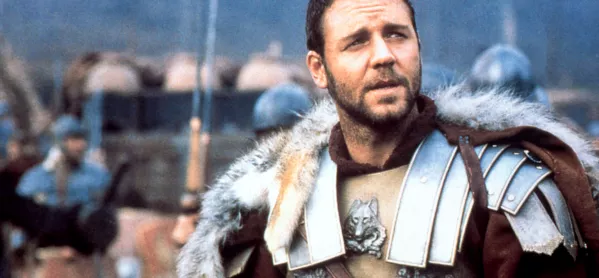- Home
- What Russell Crowe taught me about leadership
What Russell Crowe taught me about leadership

Ten years ago, I was promoted from part-time English teacher to a post entitled head of standards for key stage 4.
No one was more surprised than me. I’d spent the previous decade or so shuffling about the English department in inadequate footwear, and making sardonic comments in staff meetings.
Suddenly, in a salary-doubling move, I was catapulted to within an inch of SLT. And I had the tricky task of reinventing myself for a staff and student body who knew me mainly for tutting and rolling my eyes and for my unbridled performances at staff karaoke.
The Gladiator role model
My first step, in a bold attempt to live up to the title of head of standards (as my son pointed out at the time, it was ironic that those words appeared below a picture of a woman who’d clearly let herself go), was to buy some more substantial shoes.
The second was to adopt a leadership model that proved I meant business. I’d been out of the “aspiring leader” loop for a while, so I hadn’t had an opportunity to sift through a CPD card-sort of notable historical figures - from Mother Teresa to Adolf Hitler - and arrange them in order of leadership impact.
Instead, I had to rely on my own sources. Barack Obama had recently been appointed president of the United States, and I felt his measured tones would be a good place to start. David Tennant was finishing his stint as Dr Who, and who wouldn’t love his good humour and unashamed joy in knowledge in the face of adversity?
But a late-night Channel 5 screening of Gladiator provided me with an answer. It had long been a favourite - and what’s not to like? Fighting, costumes, CGI and the glory that is Russell Crowe on a horse.
Leadership: Holding the line
I first saw it in 2000 at the cinema, and had been won over by - among other things - Crowe’s portrayal of gravel-voiced sincerity.
But it was the battle scenes that impressed me: Maximus addressing his centurions, before galloping down a wooded hill bellowing “Hold the line! Stay with me!” and leading a well-organised army to victory against a much larger foe.
So my first assembly was a breeze. The year group entered the assembly hall to the resonant strains of the Hans Zimmer soundtrack. Although I had to explain the plot a bit - by 2009, VHS copies of Gladiator had already been relegated to the bargain bucket - my extended metaphor hit home.
I was Maximus (of course), leading from the front. The students were my troops, the impending external exams were the huge and overwhelming Barbarian horde, and our honed weapons of knowledge were the fiery arrows that were unleashed with skill and discipline.
I had a bit of trouble explaining Quintus: my year-group manager may have been my faithful lieutenant, but I couldn’t take that analogy too far in case she betrayed me after the Year 11 mocks.
A fight to the death
It was a culturally literate year group; a couple of them placed a fist on their chest and murmured “strength and honour” - not entirely ironically - as they filed out.
The assembly grew legs. “Hold the line” became the unofficial mission statement for key stage 4, and pictures of Maximus popped up on office walls. The battle theme playing at the start of assembly signalled a serious talking-to about revision.
As with all my good ideas, once I’ve had one, I gloat over it like Gollum and tend not to welcome criticism. But, recently, I’ve had to take a step back and consider whether repeatedly likening exams to a fight to the death was helpful for my students.
While a bit of adrenaline-fuelled encouragement helps, I’ve come to learn that playing down the drama is a better idea.
Learning, revisiting, consolidating and assessing is a continuous process, not the run-up to a five-act opera, or - indeed - a ferocious battle. And is it right in these days to engender a macho culture where the only response is fight or flight, rather than calm reflection?
Authority and integrity
In any event, the extended metaphor soon runs out of steam. Failed GCSEs do not lead to the green fields of Elysium - more like the grey walls of resits and compromises.
I’ve shelved Maximus in battle for now. But there’s a non-violent sequence in the film where the lessons of good pastoral leadership can be learned.
Before the battle, Maximus walks among his troops. He knows their names, he speaks to them, asks after them, acknowledges their success, expresses his pride. He is clearly higher status, but he wears his authority lightly and with integrity.
Ten years on, that’s still a model I aspire to. I might look like a stout, middle-aged director of learning (thankfully my title has changed from head of standards) on the outside, but I lead my year group with the heart of a Roman general.
Sarah Ledger has been teaching English for 33 years
Keep reading for just £1 per month
You've reached your limit of free articles this month. Subscribe for £1 per month for three months and get:
- Unlimited access to all Tes magazine content
- Exclusive subscriber-only stories
- Award-winning email newsletters



